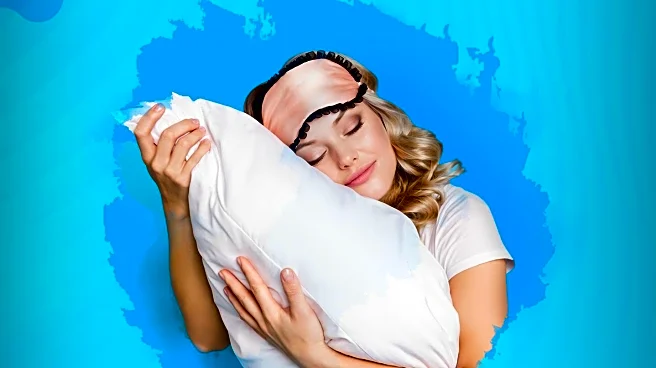What's Happening?
AG1 has introduced a new sleep supplement called AGZ, designed to support restful and restorative sleep without the use of melatonin. The supplement combines adaptogens, herbs, and minerals to aid the three stages of rest: relaxing, sleeping, and waking
up. AGZ is NSF Certified for Sport, ensuring high quality and safety standards. It is suitable for paleo, vegan, and vegetarian diets but is not recommended for individuals under 18, pregnant, or breastfeeding. The supplement is available in flavors such as mixed berry, chocolate, and chocolate mint, and can be consumed cold, warm, or at room temperature.
Why It's Important?
The introduction of AGZ reflects a growing trend in the health and wellness industry towards natural sleep aids that avoid the side effects associated with melatonin. This development is significant for consumers seeking alternatives to traditional sleep medications, which can disrupt circadian rhythms and cause grogginess. AGZ's formulation aims to support natural melatonin production and improve sleep quality, potentially benefiting individuals with stress-induced insomnia or sleep deprivation. The product's NSF certification also highlights the importance of safety and quality in health supplements, appealing to athletes and wellness enthusiasts.
What's Next?
AG1's launch of AGZ may prompt other companies in the health supplement industry to explore similar melatonin-free products, potentially leading to increased competition and innovation in the market. Consumers may begin to shift towards supplements that offer natural sleep support without adverse effects. Additionally, AG1's marketing strategy, including endorsements from celebrities and athletes, could influence consumer perceptions and drive demand for AGZ. The company may also expand its product line to include more flavors or formulations tailored to specific sleep needs.
Beyond the Headlines
The development of AGZ raises questions about the long-term impact of melatonin-free supplements on sleep health and consumer behavior. As more individuals seek natural alternatives, there may be increased scrutiny on the efficacy and safety of herbal and adaptogenic ingredients. This shift could also influence public health policies regarding sleep aids and encourage further research into non-pharmaceutical sleep solutions. The cultural acceptance of sleep supplements as part of a healthy lifestyle may continue to grow, shaping future trends in wellness and self-care.















